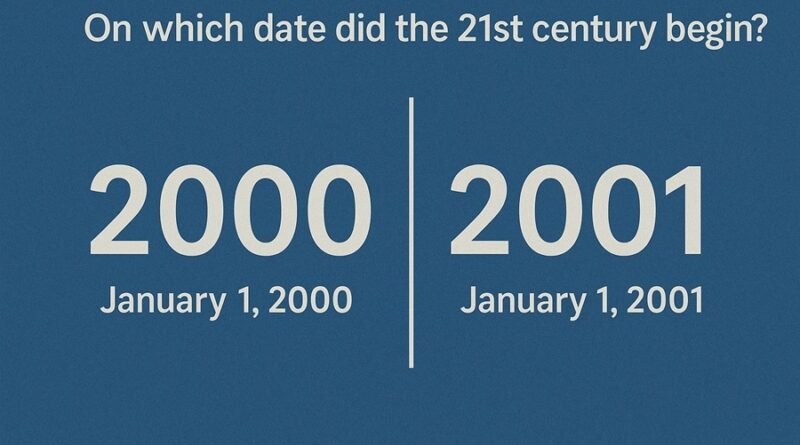On Which Date Did the 21st Century Begin?
The beginning of the 21st century has been a subject of debate, primarily due to differences in how people define centuries in relation to our calendar system. While most people assume that the 21st century began on January 1, 2000, the precise and widely accepted date among historians, astronomers, and calendar experts is January 1, 2001. This article explores the reasoning behind this conclusion, the historical context of century definitions, and the public perception of the event.
Understanding How Centuries Are Counted
To determine when the 21st century began, we must first understand how our calendar system works. The Gregorian calendar, the internationally accepted civil calendar, is based on the Anno Domini (A.D.) system, which was introduced by Dionysius Exiguus, a 6th-century monk who created a method to calculate the years since the birth of Jesus Christ.
Why Didn’t the 21st Century Start in the Year 2000?
One of the main sources of confusion is that people often assume that centuries begin when the year number shifts to a round number (e.g., 1900, 2000). However, because our calendar does not include a Year 0, the first century began with the year A.D. 1 and ended with the year A.D. 100. This means that every subsequent century follows the same pattern:
- The 1st century: A.D. 1 – A.D. 100
- The 2nd century: A.D. 101 – A.D. 200
- The 20th century: A.D. 1901 – A.D. 2000
- The 21st century: A.D. 2001 – A.D. 2100
Since each century consists of 100 full years, and the 20th century ended on December 31, 2000, the 21st century officially began on January 1, 2001.
The Year 2000 as a Symbolic Start
Despite the precise calculation, many people celebrated the beginning of the new millennium on January 1, 2000 rather than January 1, 2001. The reason for this is psychological and cultural rather than mathematical:
- The excitement of a new millennium: The transition from a year ending in “99” to a year ending in “00” was visually and emotionally significant. The number “2000” symbolized a fresh start, and people naturally associated it with the beginning of a new era.
- Media and public perception: The year 2000 was widely marketed as “the new millennium,” leading to large-scale celebrations worldwide. Many companies, news outlets, and even governments reinforced the idea that January 1, 2000, was the start of the 21st century.
- The Y2K scare: The Year 2000 Problem (Y2K Bug) added to the anticipation. Many believed that computer systems would fail due to the way dates were stored, reinforcing the perception that something major was happening at the turn of the year 2000.
While January 1, 2000, was an important cultural and psychological milestone, it was not the actual start of the 21st century.
Official Stances on the 21st Century’s Start Date
Various organizations and authorities confirmed that the 21st century began on January 1, 2001.
- United States Naval Observatory (USNO): The USNO, the organization responsible for official timekeeping in the U.S., confirmed that the 21st century and 3rd millennium started on January 1, 2001.
- Royal Greenwich Observatory (RGO): The RGO, a leading authority on timekeeping, also recognized January 1, 2001, as the official start date.
- International Astronomical Union (IAU): The IAU, which oversees astronomical and calendrical matters, adhered to the logic of the Gregorian calendar and stated that the new century began in 2001, not 2000.
Despite these authoritative confirmations, the general public largely celebrated the arrival of the 21st century on January 1, 2000.
Historical Parallels: The 20th Century Debate
A similar debate occurred at the turn of the 20th century. Many people assumed that the 20th century began on January 1, 1900, when in fact, it officially started on January 1, 1901. Newspapers and historians of the time had to clarify the distinction, just as they did in 1999.
Read this: With Which Country Does France Share Its Longest Border?
Conclusion: The 21st Century Began on January 1, 2001
Mathematically and historically, the 21st century began on January 1, 2001. However, due to cultural, psychological, and media influences, many people celebrated its arrival on January 1, 2000. While the latter date was significant in its own right, it was not technically the start of the new century.
This discrepancy highlights an interesting aspect of human perception: while logic and historical accuracy dictate one answer, public sentiment and cultural influence can sometimes create an entirely different reality.
Did you celebrate the turn of the millennium on January 1, 2000, or did you wait until January 1, 2001?

